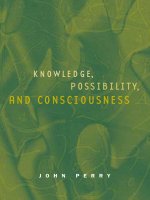the mit press new essays on semantic externalism and self-knowledge jun 2003
Bạn đang xem bản rút gọn của tài liệu. Xem và tải ngay bản đầy đủ của tài liệu tại đây (1.15 MB, 330 trang )
New Essays on Semantic Externalism and
Self-Knowledge
This page intentionally left blank
New Essays on Semantic Externalism and
Self-Knowledge
edited by Susana Nuccetelli
A Bradford Book
The MIT Press
Cambridge, Massachusetts
London, England
( 2003 Massachusetts Institute of Technology
All rights reserved. No part of this book may be reproduced in any form by any
electronic or mechanical means (including photocopying, recording, and
information storage and retrieval) without permission in writing from the
publisher.
This book was set in New Baskerville on 3B2 by Asco Typesetters, Hong Kong,
and was printed and bound in the United States of America.
Library of Congress Cataloging-in-Publication Data
New essays on semantic externalism and self-knowledge / edited by Susana
Nuccetelli.
p. cm.
‘‘A Bradford book.’’
Includes bibliographical references and index.
ISBN 0-262-14083-7 (alk. paper)
1. Externalism (Philosophy of mind). 2. Self-knowledge, Theory of.
I. Nuccetelli, Susana.
BD418.3 N49 2003
121
0
.4—dc21 2002032416
10987654321
Contents
Acknowledgments ix
Introduction 1
Susana Nuccetelli
1
The Problem of Armchair Knowledge 23
Martin Davies
2
Some Reflections on the Acquisition of Warrant by Inference 57
Crispin Wright
3
McKinsey’s Challenge, Warrant Transmission, and Skepticism 79
Brian P. McLaughlin
4
Transmission of Warrant and Closure of Apriority 97
Michael McKinsey
5
The Reductio Argument and Transmission of Warrant 117
Jessica Brown
6
Externalism and Self-Knowledge 131
Fred Dretske
7
A Puzzle about Doubt 143
Gary Ebbs
8
Knowing That One Knows What One Is Talking About 169
Susana Nuccetelli
9
Two Transcendental Arguments Conce rning Self-Knowledge 185
Anthony Brueckner
10
Externalism, Davidson, and Knowledge of Comparative Content 201
Joseph Owens
11
Memory and Knowledge of Content 219
Kevin Falvey
12
What Do You Know When You Know Your Own Thoughts? 241
Sandford C. Goldberg
13
Introspection and Internalism 257
Richard Fumerton
14
Two Forms of Antiskepticism 277
Matthias Steup
vi Contents
References 295
Contributors 307
Index 311
Contents vii
This page intentionally left blank
Acknowledgments
A number of people have been especially helpful to me in assembling
this collection. First, I wish to thank my dissertation adviser, Stephen
Schiffer, from whom I learned a great deal while writing on externalism
and self-knowledge. My views on this and other matters of epistemology,
philosophy of language, and philosophy of mind have also benefitted
from discussions with Brian Loar, Stephen Stich, Ernest Sosa, Anthony
Brueckner, Jonathan Adler, and Gary Ostertag. Matthias Steup, Bernard
Baumrin, and Steven Cahn have all encouraged me to pursue this
project, and I am grateful for their support. Gary Seay deserves special
mention for having helped me during the whole process of putting this
volume together, making comments that always led to improvements.
This page intentionally left blank
New Essays on Semantic Externalism and
Self-Knowledge
This page intentionally left blank
Introduction
Susana Nuccetelli
1 The Supervenience of Content
Semantic externalism or anti-individualism is often cast as the rejection
of semantic internalism or individualism, a view favored by philosophers
at least since Descartes (hereafter, ‘externalism’ and ‘internalism’).
The latter takes mental properties with content to supervene upon the
intrinsic properties of individuals, while the former denies that thesis,
holding instead that, necessarily, two individuals could be identical in all
their intrinsic properties (nonintentionally described) and have mental
properties with different content. Yet it is sometimes thought that exter-
nalism, though plausible, might be incompatible with well-accepted
intuitions about self-knowledge and knowledge of the empirical world.
For if content varied in the ways suggested by externalists, then to know
that one is having a mental property with a certain content, one might
first have to know what conditions obtained in one’s physical and/or
social environment, that is, skepticism about privileged self-knowledge
seems a consequence of their doctrine. Moreover, the attempt to hold
externalism concurrently with privileged self-knowledge might face a
reductio, since it would then appear that substantial propositions about
one’s environment could be known by simple deduction from non-
empirical premises. After all, not only does it appear that one has privi-
leged access to self-ascriptive beliefs about one’s propositional-attitude
contents, but knowledge of externalist entailments from those contents
to the environment also seems available a priori in some sense.
More needs to be said, however, about externalism if we are to deter-
mine whether the attempt to hold it, together with some plausible epis-
temic intuitions, supports any of these objections. What, then, are its
main claims and arguments?
2 Externalism versus Internalism
Externalists and internalists can first be seen as endorsing opposite
theses about propositional attitudes with certain contents, such as the
belief that water is wet, the fear that one has arthritis in one’s thigh,
or the hope that one could sit on a comfortable sofa. Roughly, when
propositional attitudes are taken, as they usually are, to be mental or
intentional properties of individuals (or, alternatively, predicates that
they instantiate),
1
then externalism and internalism amount to opposite
theses about those properties, holding, respectively,
Ext Not all mental properties are local properties of individuals.
Int Mental properties are local properties of individuals.
What properties may count as local could be understood a
`
la Putnam:
2
InP
1
A property is local, internal, or intrinsic if and only if it does not
presuppose the existence of anything other than the contingent object
that has it.
Furthermore, local properties preserve across individuals who are exact
internal replicas. For example, the property of having kidneys is internal
in this sense, since if an individual has it, then any internal replica of
that individual would also have it. This provides an equivalent way of
understanding properties of this sort, namely,
InP
2
A property is local, internal, or intrinsic if and only if it preserves
across internal replicas.
Given internalism, all mental properties of individuals are local in this
sense, but then surely mental properties with content must be local in the
same way too. What shall we make of this internalist claim? To external-
ists such as Tyler Burge, it amounts to holding that ‘‘an individual’s
intentional states and events (types and tokens) could not be different
from what they are, given the individual’s physical, chemical, neural, or
functional histories, where these histories are specified nonintentionally
and in a way that is independent of physical or social conditions outside
the individual’s body’’ (1986a: 4). Externalists are committed to denying
this, since on their view propositional attitudes with certain contents
(e.g., the belief that water is wet, the fear that one has arthritis in one’s
thigh, and the hope that one could sit on a comfortable sofa) must be
cashed out as nonlocal properties of individuals, where
2 Susana Nuccetelli
ExP
1
A property is nonlocal, external, or extrinsic if and only if it does
presuppose the existence of something other than the contingent object
that has it.
3
When a property is external, any object may have it only in virtue of its
relationships to other objects. The property of being west of Central
Park is external in this way, since whether one has it depends on how
one is geographically situated with respect to Central Park. Given exter-
nalism, having either the belief that water is wet or other propositional
attitudes with certain contents would be in some sense analogous to
being west of Central Park, simply because the content type of some such
attitudes would supervene on the relations of those who entertain them
with their physical and/or social environments. If this is right, then the
content of some (perhaps, many) propositional attitudes is determined
in part by the relations of individuals who have those attitudes with
things ‘‘outside’’ them, which are in this way external or extrinsic to
them.
But since external properties are standardly defined by contrast with
internal ones, and the latter can be construed in various alternative
ways, let us consider another way of casting the former, one that focuses
on whether or not the relevant properties are preserved across individ-
uals who are internal replicas. By contrast with internal properties, now
we must say,
ExP
2
A property is nonlocal, external, or extrinsic if and only if it may
not preserve across internal replicas.
Compare being west of Central Park. When I am at the Museum of
Natural History, I have that property, while my replica, who at that time
is at the Metropolitan Museum, lacks it. If externalists are right, then
having a propositional attitude with a certain content (e.g., the belief
that water is wet) is similar to being west of Central Park in that in both
cases, there could be instances in which the referred property fails to
preserve across internal duplicates. If so, then the property involved is
by definition an external one.
Note, however, that a mental property could be literally ‘‘inside’’ the
person, yet supervene on factors external to that person. In the context
of this debate, the ‘inside/outside’ distinction is, of course, a metaphor.
As famously argued by Donald Davidson (1987), although a sunburn
supervenes on what caused it, it is nonetheless a condition ‘‘in’’ one’s
skin. Given externalism, having the belief that water is wet or the fear
Introduction 3
that one has arthritis in one’s thigh would be external to the individual
who entertains any of these in the same sense that having a sunburn is:
although they too are ‘‘inside’’ the individual who entertains them, they
nonetheless supervene on external factors in his physical and/or social
environment.
We can now state the crucial issue in this debate more perspicuously.
Internalism consists in a supervenience thesis, which has a number of
roughly equivalent construals. First, it can be seen as holding,
I
1
Necessarily, no two individuals x (in any possible world) and y (in
any possible world) could have the same internal properties but differ in
their mental properties with content (in their respective worlds).
Alternatively,
I
2
Indiscernibility with respect to internal properties entails indiscer-
nibility with respect to mental properties with content.
Or, as the common supervenience slogan has it,
I
3
No difference in mental properties with content without a differ-
ence in internal properties.
Given the local supervenience of mental properties with content, any
two individuals could not differ in those properties without some dif-
ference in their internal properties.
4
Imagine a scenario in which one
individual has some mental property B while the other lacks it: the
internalist would infer that the internal properties of these individuals
are different. Now imagine two individuals, one of whom instantiates
mental property B while the other instantiates a different mental prop-
erty C: the internalist would likewise infer here that these individuals
differ in their internal properties. Such conclusions are, of course, in
conflict with the intuitions elicited by standard externalist thought
experiments devised to show precisely that any two individuals could
be exact internal duplicates yet have mental properties with different
content. Externalists, then, reject the above internalist theses, claiming
instead that
Ext
1
Necessarily, any two internally identical individuals x (in any pos-
sible world) and y (in any possible world) could differ in their mental
properties with content (in their respective worlds).
Alternatively,
4 Susana Nuccetelli
Ext
2
Indiscernibility with respect to internal properties does not entail
indiscernibility with respect to mental properties with content.
Needless to say, the debate about whether mental properties with con-
tent supervene locally raises complex issues. Some of these arise from
‘supervenience’ itself, since this notion may be understood in several
ways.
5
But, even if we adopt some adequate construal of ‘superveni-
ence’, there will still be questions in need of clarification concerning
the externalist and internalist modal claims.
6
And there is, of course, the
large issue of alternative ways of casting externalism itself—to which we
now turn.
3 Other Externalist Claims
It is not uncommon to find externalism and internalism cast in terms of
opposite claims about the individuation of propositional-attitude con-
tent kinds (types). To Burge, for example, the whole debate is in fact
about ‘‘how kinds are correctly individuated, how their natures are
fixed’’ (1986a: 3). If, as externalists maintain, the content of certain
propositional-attitude tokens is in part individuated by environmental
factors, then those factors in part determine the content type instanti-
ated by those tokens. When the debate is framed in this way, ‘individu-
ation’ is, of course, a term of art that can be taken to express the
following relation:
Ind For any token y, x individuates y if and only if x determines y’s
type.
But the debate may also concern whether or not mental properties
supervene entirely on factors within the physical individual—these
being, for example, some behavioral dispositions or, perhaps, brain
states. (Naturally, any additional claim of this sort would seem unavail-
able to the internalist who is also a dualist, but in the present context
we may ignore dualistic internalism.) On this recast, internalism is the
thesis that all mental properties preserve across individuals who are
physical, internal replicas, and a fortiori, that
Int
2
*
Mental properties with content preserve across physical, internal
replicas.
Needless to say, externalists cannot accept this version of internalism
either, since their own supervenience thesis commits them to holding,
Introduction 5
Ext
2
*
Some mental properties with content may not preserve across
physical, internal replicas.
Standard externalist thought experiments, often run to support
claims such as Ext
2
Ã
, suggest that externalists take their disagreement
with internalists to boil down to whether propositional-attitude contents
could vary with relevant changes in the physical environment (Putnam
1975), the physical and social environments (Burge 1979), or the causal
histories of individuals (Davidson 1987). In each of these cases their
intuition is that, given relevant external changes, an individual could
have a propositional attitude with a certain content—say believing that
water is wet—while a physical internal replica may lack it. But if exter-
nalist thought experiments are sound, then the following theses also
appear plausible:
Ext
3
Mental properties with certain contents depend in part on physi-
cal and/or social environmental factors.
Ext
4
Any correct psychological account of an individual’s having (or
lacking) mental properties with certain contents must consider some
factors in that individual’s physical and/or social environment.
That is, the internalist/externalist disagreement about supervenience
theses is likely to carry over to a disagreement about dependency and
explanatory claims. Although all that is needed to set out externalism
and internalism is simply opposing supervenience theses about mental
properties with content, the debate often turns into Ext
3
and Ext
4
,
which raise the further questions of dependency claims involving mental
properties with content and the role of external properties in psycho-
logical explanation. Let us have a quick look at the latter. Externalists
and internalists take opposite sides on whether or not this kind of
explanation must consider only factors ‘‘inside’’ the individual who has
those properties. Internalists hold ‘‘that an individual’s being in any
given intentional state (or being the subject of such an event) can be
explicated by reference to states and events of the individual that are
specifiable without using intentional vocabulary and without presuppos-
ing anything about the individual subject’s social or physical environ-
ments’’ (Burge 1986a: 4). Externalists, on the other hand, often insist
that such an account must also consider those factors ‘‘outside’’ the
individual which in part determine his being in a state of having mental
properties with certain contents. That is, externalists whose view of psy-
6 Susana Nuccetelli
chological explanation is along the lines of Ext
4
are committed to
rejecting the following internalist position:
Int
4
Any correct psychological account of an individual’s having men-
tal properties with content must consider only the individual’s internal
properties.
But how are further claims of this sort related to the acceptance or
rejection of local supervenience for mental properties with content?
How, for example, is the externalists’ explanatory claim Ext
4
related to
their rejection of local supervenience in Ext
1
and Ext
2
? A sound argu-
ment for any of the latter is likely to count as a reason for the former.
The support thus provided would not be conclusive, however, since Ext
4
fails to be entailed by either Ext
1
or Ext
2
. Clearly, there is no inconsis-
tency in holding, for example, both the external supervenience of con-
tent and the view that the only properties relevant to psychological
explanation are those that supervene locally.
7
At the same time, this
suggests that the issues involved in trying to answer the above questions
are complex, falling altogether beyond what can be examined by this
introduction.
8
Whether or not the externalists’ further claims are sup-
ported, there is in any case no doubt that if just their supervenience
thesis is supported, that alone would suffice to undermine internalism. It
is, therefore, the plausibility of that thesis that requires a closer look.
4 Externalist Thought Experiments
The externalist supervenience claim can be shown to rest on thought
experiments and independent arguments. Among the former, Twin
Earth and arthritis cases are often advanced to support physical
externalism (Putnam 1975) and social externalism (Burge 1979), re-
spectively. In both cases, however, the conclusion is that propositional-
attitude content may vary ‘‘even as an individual’s physical (functional,
phenomenological) history, specified nonintentionally and individualis-
tically, remains constant’’ (Burge 1986a: 6). And both thought experi-
ments require the assumption that that-clauses are good guides to
propositional-attitude content. A Twin Earth thought experiment runs,
roughly, as follows:
9
first, imagine Oscar, a chemically ignorant inhabit-
ant of the actual world w
1
, who has had regular causal contact with H
2
O
and sincerely utters, ‘Water is wet’—thereby reporting what can be cor-
rectly described as a belief that water is wet. Call the mental property
Introduction 7
of being a thought with that content ‘B’. In w
1
, then, Oscar has B.In
a counterfactual situation w
2
, however, an equally ignorant identical
twin (who shares all Oscar’s internal properties, including surface stim-
ulations, internal chemistry, etc., nonintentionally described) similarly
utters, ‘Water is wet’. Here the externalist contends that since, by
hypothesis, there is no H
2
Oinw
2
but some qualitatively identical sub-
stance (e.g., XY Z), the belief reported by twin Oscar would not have the
content that water is wet. In w
2
, then, Oscar lacks property B. If that
intuition is found compelling, it follows that individuals who are exact
replicas from the skin inwards may nonetheless have propositional atti-
tudes with different contents. But this of course amounts to Ext
1
, the
thesis that mental properties with content do not supervene on the
internal properties of individuals.
The ‘arthritis’ case (Burge 1979) has a similar structure, though it
aims at showing the supervenience of propositional-attitude content on
social factors in the thinker’s environment. Imagine Bert, living in the
actual world w
1
and having a certain propositional attitude involving the
term/concept ‘arthritis’, which he erroneously applies (through either
misconception or incomplete understanding) to a disease of both bones
and joints. But now suppose a counterfactual situation w
2
, where Bert’s
physical, behavioral, linguistic, and phenomenal events and experience
(nonintentionally described) are exactly the same as in w
1
, but where
his propositional attitude involves a certain term, ‘arthritis’, that he
applies correctly, as standardly used in his linguistic community: in w
2
,
‘arthritis’ means disease of both bones and joints. The externalist con-
tends that in w
1
, when Bert sincerely tells his doctor ‘I have arthritis in
my thigh’, although he says something false, he is nonetheless reporting
what can be correctly described as the belief that he has arthritis in his
thigh. Call the mental property of being a thought with that content ‘C ’.
In w
1
, then, Bert has property C. On the other hand, in w
2
, when Bert
sincerely tells his doctor ‘I have arthritis in my thigh’, although he
says something true, he is not thereby reporting what can be correctly
described as the belief that he has arthritis in his thigh. Since in w
2
Bert’s speech community uses ‘arthritis’ to talk about a disease of both
bones and joints, even though Bert’s internal properties have remained
constant, his propositional attitude has a different content, perhaps that
he has t-arthritis in his thigh. In w
2
, then, Bert lacks property C. ‘‘The
upshot of these reflections,’’ writes Burge (1979: 540), ‘‘is that the
patient’s mental contents differ while his entire physical and noninten-
tional mental histories, considered in isolation from their social context,
8 Susana Nuccetelli
remain the same. . . . The differences seem to stem from differences
‘outside’ the patient considered as an isolated physical organism, causal
mechanism, or seat of consciousness.’’
Note that arthritis-type cases extend the reach of externalist claims,
for now the social externalist could hold that many of an individual’s
propositional attitudes (involving artifact terms, color adjectives, social-
role terms, etc.) fail to supervene locally.
10
This seems precisely what
Burge’s (1979, 1986b) thought experiments involving notions such
as ‘contract’, ‘brisket’, ‘mortgage’, and ‘sofa’ suggest. Given Burgean
externalism, there would in fact be very few concepts that may not
qualify for either a Twin Earth thought experiment or an arthritis-type
case.
11
5 Other Arguments for Externalism
Assuming that words and thoughts have analogous semantic properties,
certain arguments devised to show the inevitable failure of internal-
ism about the former, would, if sound, also undermine internalism
about the latter. For, clearly, if linguistic meaning and reference do
not supervene on local properties of individuals, then neither does
propositional-attitude content. Among those who deny the local super-
venience of semantic properties are the new theorists of reference,
whose reasons against a certain version of Fregean semantics may be
taken to support externalism about meaning and reference. If so, then
similar reasons would support externalism about intentional content.
The argument runs as follows:
(1) The new theory of reference is plausible.
(2) If (1), then meaning and reference do not supervene locally.
(3) If meaning and reference do not supervene locally, then neither
does propositional-attitude content.
(4) Therefore, propositional-attitude content does not supervene
locally.
Premise (1) is supported by some compelling reasons undermining
Fregeanism, an internalist account of public-language semantic proper-
ties, such as meaning and reference.
12
If the new theory of reference
can be considered the only alternative to Fregeanism, then, given those
reasons, (1) comes out true. In addition, (2) spells out an entailment of
Introduction 9
that theory, and (3) follows from the analogy of meaning and content.
Reports of linguistic meaning and reports of propositional-attitude con-
tent seem, after all, parallel in their syntax and in their semantics.
13
Note that although all premises appear well supported, the above valid
argument still falls short of providing conclusive grounds for (4), the
externalist supervenience claim, simply because the strength of that con-
ditional argument turns on the plausibility of the new theory of reference.
Yet, when taken to consist in a causal account of reference together with
an account of meaning that incorporates modes of presentation (see
Evans 1982), the new theory of reference appears plausible. Besides,
when broadly construed, it need not be committed to the stronger, and
therefore more controversial, theses of direct-reference semantics.
On the other hand, it is not difficult to see how externalism would
follow trivially from direct-reference semantics (that is, from neo-
Milleanism) and some common assumptions about propositional-
attitude content. Direct-reference semanticists have it that not only
do some singular terms such as demonstratives and other indexicals,
proper names, and certain definite descriptions refer without the medi-
ation of Fregean senses, but also that this is the only semantic contribu-
tion such terms make to the propositions in which they occur. On this
view, speakers of a public language must have (or have had) contact
with the relevant items of reference if their tokens of sentences con-
taining putative singular terms of that sort are to express any proposi-
tion at all. Propositions containing genuine singular terms are in this
way object-dependent: they wouldn’t exist if their objects didn’t exist.
Suppose that that-clauses are the right vehicles for identifying proposi-
tional-attitude content, and that if two propositional-attitude tokens
have different truth values, they cannot be of the same type. Externalism
would then follow from a semantic theory that countenances object-
dependent propositions. Clearly, if there are any such propositions,
then neither meaning nor content supervenes upon the local properties
of individuals.
14
6 Two Incompatibility Problems
Since externalism and the thesis that self-knowledge is in some ways
privileged are independently plausible, suppose that we wish to hold
both. Incompatibilists argue that we cannot, for there are epistemic
problems with any attempt to hold these two doctrines together. But
incompatibilists are of different persuasions: some hold that any such
10 Susana Nuccetelli
attempt faces a reductio, while others maintain that, given externalism,
one could not know one’s own propositional-attitude contents without
investigating the environment—that is, that externalism is incompatible
with our ordinary sense that each of us has a special, first-person access
to such contents.
15
Arguments for either of these conclusions, if sound,
would, of course, generate at least a puzzle for the attempt to hold such
independently plausible doctrines. Burge (1988b, 1996), Davidson (1987,
1991), and other externalists have offered several replies, but incom-
patibilists seem to remain unpersuaded.
16
What early incompatibilists (McKinsey 1991a, 1994b; Brown 1995;
Boghossian 1997) had in mind with their attempted reductio was to
show that externalists could not retain common intuitions about self-
knowledge, and that this was obvious, since their rejection of local
supervenience, together with those intuitions, might open the way to
simple deductions of this sort:
(1) I am thinking that water is wet.
(2) If I am thinking that water is wet, then some empirical condition
obtains.
(3) Therefore, some empirical condition obtains.
Suppose that the empirical condition in question is a certain substantial
matter of fact, such as that water exists. Now incompatibilists urge that,
given externalism and privileged self-knowledge, a thinker could come
to know the above premises a priori in the sense that neither would
require any specific investigation of the environment. For he could
learn externalism just by running standard Twin Earth thought experi-
ments. And since whether or not he has a thought with a certain content
may also be available to him a priori in that sense, the thinker could
deduce, and thus know entirely a priori, certain substantial propositions
about his environment, e.g., that water exists. But that conclusion clearly
conflicts with common intuitions about knowledge of the empirical
world. In short, externalists who wish to hold privileged self-knowledge
appear committed to this inference:
(1) I can know a priori that I am thinking that water is wet.
(2) I can know a priori that if I am thinking that water is wet, then
water exists.
(3) Therefore, I can know a priori that water exists.
Introduction 11
Although it may be objected that an argument of this sort, originally
proposed by Michael McKinsey, trades on an equivocation about the
epistemic status of (1) and (2), when these premises are charitably con-
strued, ‘a priori’ must be taken to apply to knowledge (or justification)
that does not depend on empirical piecemeal checking of the environ-
ment, equally satisfied by (1) and (2). And since the inferential princi-
ple fueling the argument seems as independently well supported as
externalism and privileged self-knowledge, it appears that the attempt to
hold such doctrines would, after all, have the intolerable consequence
that substantial empirical propositions could then be known entirely
a priori. Not only does the McKinsey argument seems sound, but the
plausibility of its premises appears as compelling as the absurdity of its
conclusion. Something has gone wrong here.
There is, however, logical space for some replies. To begin with, is
it really plausible that, on semantic-externalist assumptions, a thinker
could know a priori that his propositional-attitude contents entail some
empirical propositions? According to incompatibilists, someone could
come to know externalism entirely on the basis of standard Twin Earth
thought experiments and philosophical arguments, all of which amount
to a priori means to knowledge. And knowing externalism in this way,
he could figure out, just by thinking, that his having propositional atti-
tudes with some contents entailed certain propositions about his envi-
ronment. Yet substantial claims about the dependence of content on
environmental factors may not be available a priori, if, as I would argue,
the externalist conclusion from Twin Earth cases is properly construed.
On my view, presented in chapter 8 of this volume, any tenable doctrine
holding that concepts of some sort are individuated in terms of their
referents must rest on certain semantic intuitions which are compati-
ble only with empirical knowledge of propositions containing those
concepts.
But suppose one grants that the premises of the McKinsey argument
are a priori. Still more is needed to get the incompatibilist reductio off
the ground. For there remains the larger issue of whether the epis-
temic status of premises about one’s own propositional-attitude contents
and their externalist entailments can transmit to the conclusion of the
argument. If the principle fueling the inference merely sanctions that
a priori knowledge is closed under known entailment, then since that
is comparatively weaker than other closure principles, it seems there-
fore intuitively more acceptable. But in this volume, Martin Davies and
Crispin Wright independently propose new examples to show how
12 Susana Nuccetelli









